Evaluating Modern Psychiatric Care for Mentally Disordered Offenders
VerifiedAdded on 2023/02/01
|13
|3662
|90
Essay
AI Summary
This essay critically assesses the effectiveness of modern psychiatric services in treating mental illness and mentally disordered offenders. It discusses the forensic assessment process, highlighting potential sources of oppression and discrimination, and appraises the development of forensic care in relation to social, political, and economic trends. The essay examines the role of multidisciplinary teams, the structure of forensic mental health services including inpatient and outpatient care, and the use of the Mental Health Act. It considers the advantages and disadvantages of detention in psychiatric settings versus prison, addressing stigma, labeling, and power dynamics. The analysis also touches on racism and discrimination within the system and improvements to psychiatric care over recent years.
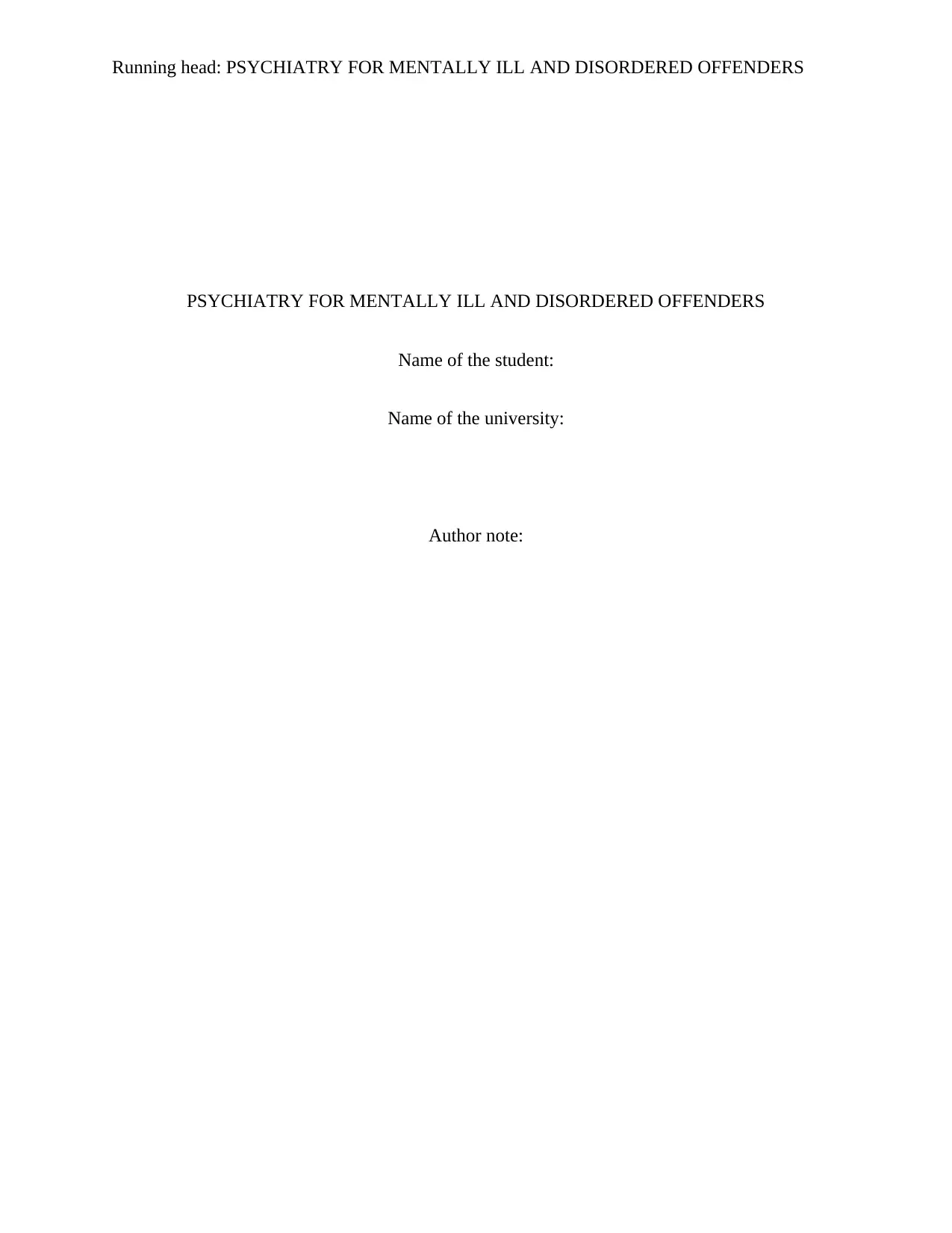
Running head: PSYCHIATRY FOR MENTALLY ILL AND DISORDERED OFFENDERS
PSYCHIATRY FOR MENTALLY ILL AND DISORDERED OFFENDERS
Name of the student:
Name of the university:
Author note:
PSYCHIATRY FOR MENTALLY ILL AND DISORDERED OFFENDERS
Name of the student:
Name of the university:
Author note:
Paraphrase This Document
Need a fresh take? Get an instant paraphrase of this document with our AI Paraphraser
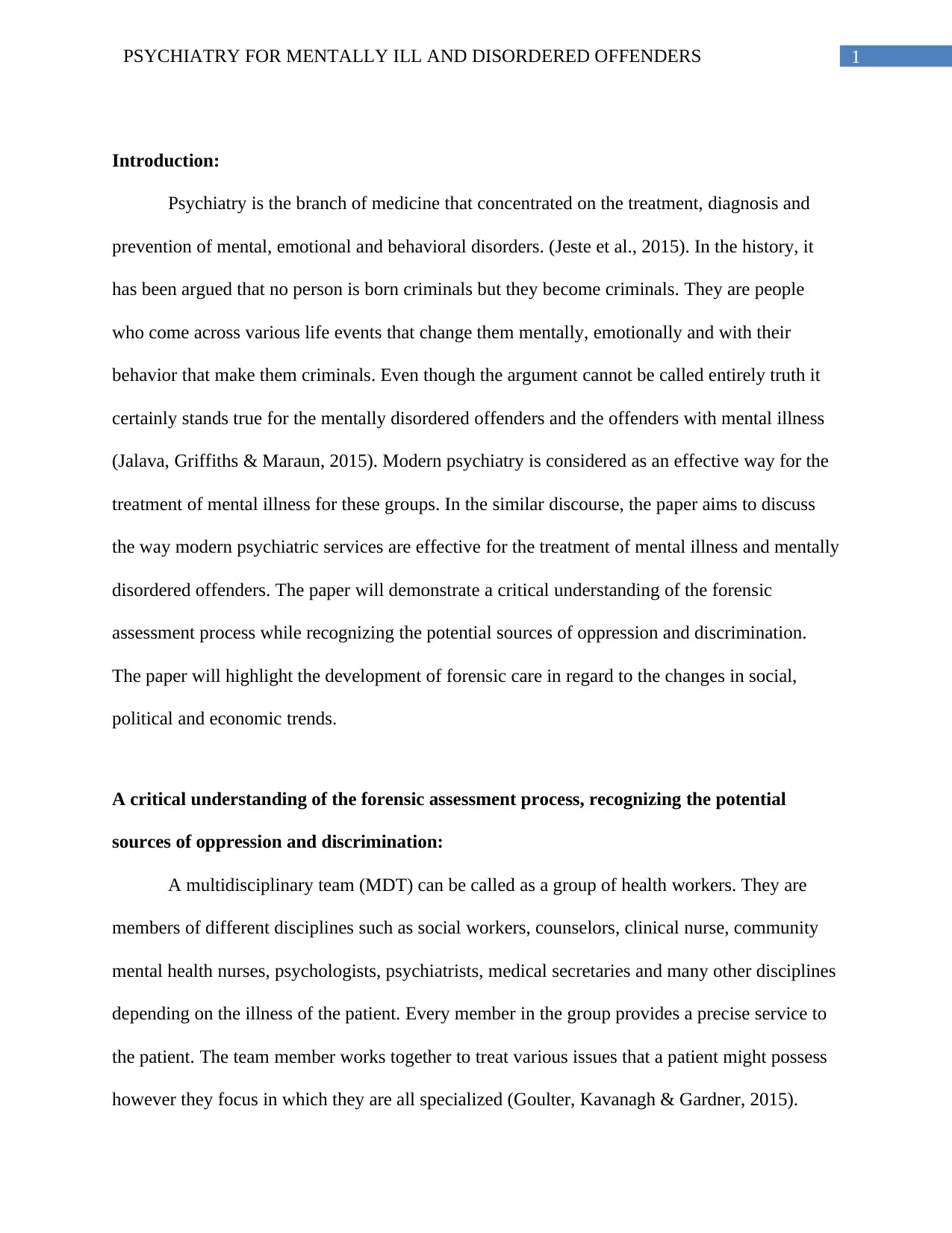
1PSYCHIATRY FOR MENTALLY ILL AND DISORDERED OFFENDERS
Introduction:
Psychiatry is the branch of medicine that concentrated on the treatment, diagnosis and
prevention of mental, emotional and behavioral disorders. (Jeste et al., 2015). In the history, it
has been argued that no person is born criminals but they become criminals. They are people
who come across various life events that change them mentally, emotionally and with their
behavior that make them criminals. Even though the argument cannot be called entirely truth it
certainly stands true for the mentally disordered offenders and the offenders with mental illness
(Jalava, Griffiths & Maraun, 2015). Modern psychiatry is considered as an effective way for the
treatment of mental illness for these groups. In the similar discourse, the paper aims to discuss
the way modern psychiatric services are effective for the treatment of mental illness and mentally
disordered offenders. The paper will demonstrate a critical understanding of the forensic
assessment process while recognizing the potential sources of oppression and discrimination.
The paper will highlight the development of forensic care in regard to the changes in social,
political and economic trends.
A critical understanding of the forensic assessment process, recognizing the potential
sources of oppression and discrimination:
A multidisciplinary team (MDT) can be called as a group of health workers. They are
members of different disciplines such as social workers, counselors, clinical nurse, community
mental health nurses, psychologists, psychiatrists, medical secretaries and many other disciplines
depending on the illness of the patient. Every member in the group provides a precise service to
the patient. The team member works together to treat various issues that a patient might possess
however they focus in which they are all specialized (Goulter, Kavanagh & Gardner, 2015).
Introduction:
Psychiatry is the branch of medicine that concentrated on the treatment, diagnosis and
prevention of mental, emotional and behavioral disorders. (Jeste et al., 2015). In the history, it
has been argued that no person is born criminals but they become criminals. They are people
who come across various life events that change them mentally, emotionally and with their
behavior that make them criminals. Even though the argument cannot be called entirely truth it
certainly stands true for the mentally disordered offenders and the offenders with mental illness
(Jalava, Griffiths & Maraun, 2015). Modern psychiatry is considered as an effective way for the
treatment of mental illness for these groups. In the similar discourse, the paper aims to discuss
the way modern psychiatric services are effective for the treatment of mental illness and mentally
disordered offenders. The paper will demonstrate a critical understanding of the forensic
assessment process while recognizing the potential sources of oppression and discrimination.
The paper will highlight the development of forensic care in regard to the changes in social,
political and economic trends.
A critical understanding of the forensic assessment process, recognizing the potential
sources of oppression and discrimination:
A multidisciplinary team (MDT) can be called as a group of health workers. They are
members of different disciplines such as social workers, counselors, clinical nurse, community
mental health nurses, psychologists, psychiatrists, medical secretaries and many other disciplines
depending on the illness of the patient. Every member in the group provides a precise service to
the patient. The team member works together to treat various issues that a patient might possess
however they focus in which they are all specialized (Goulter, Kavanagh & Gardner, 2015).
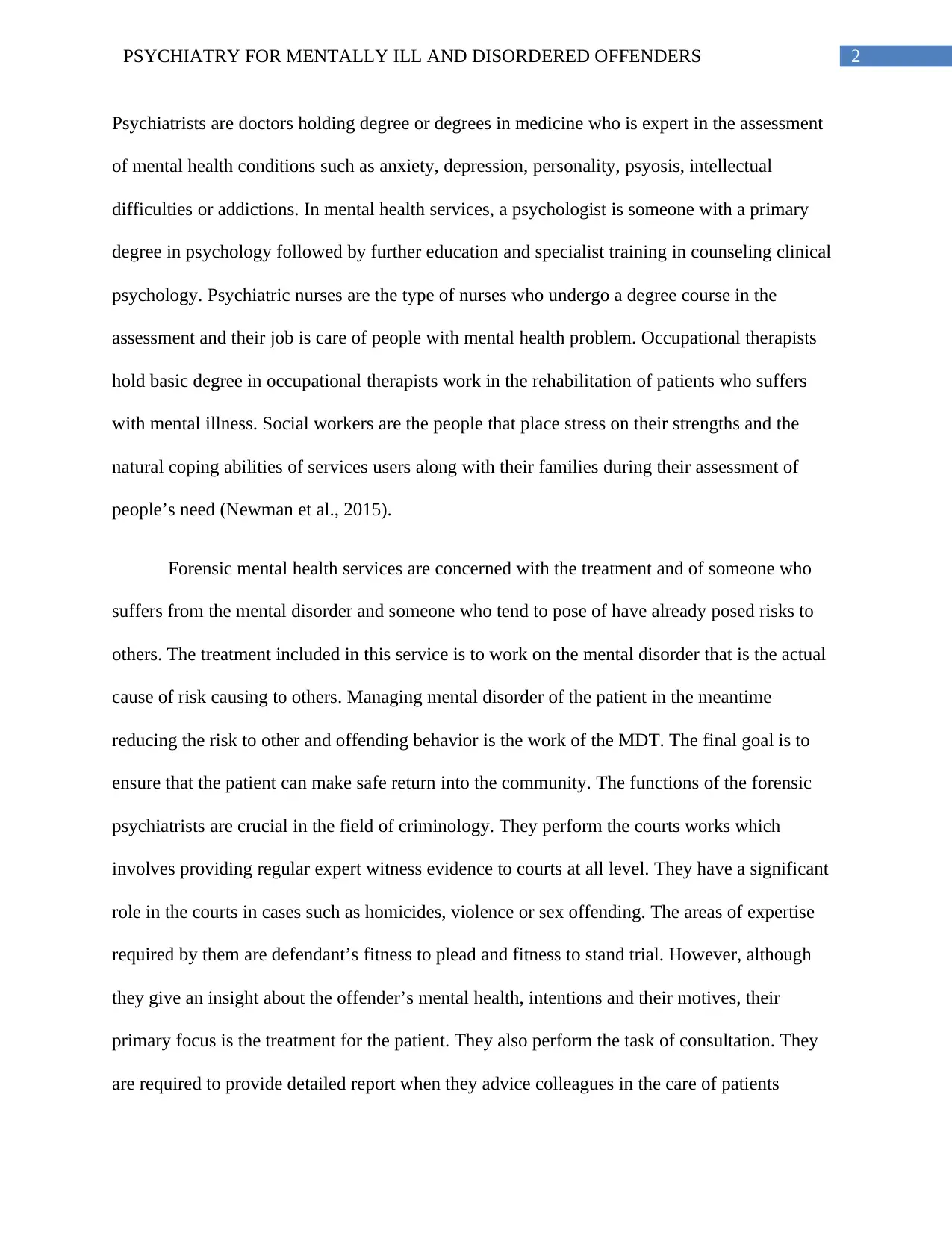
2PSYCHIATRY FOR MENTALLY ILL AND DISORDERED OFFENDERS
Psychiatrists are doctors holding degree or degrees in medicine who is expert in the assessment
of mental health conditions such as anxiety, depression, personality, psyosis, intellectual
difficulties or addictions. In mental health services, a psychologist is someone with a primary
degree in psychology followed by further education and specialist training in counseling clinical
psychology. Psychiatric nurses are the type of nurses who undergo a degree course in the
assessment and their job is care of people with mental health problem. Occupational therapists
hold basic degree in occupational therapists work in the rehabilitation of patients who suffers
with mental illness. Social workers are the people that place stress on their strengths and the
natural coping abilities of services users along with their families during their assessment of
people’s need (Newman et al., 2015).
Forensic mental health services are concerned with the treatment and of someone who
suffers from the mental disorder and someone who tend to pose of have already posed risks to
others. The treatment included in this service is to work on the mental disorder that is the actual
cause of risk causing to others. Managing mental disorder of the patient in the meantime
reducing the risk to other and offending behavior is the work of the MDT. The final goal is to
ensure that the patient can make safe return into the community. The functions of the forensic
psychiatrists are crucial in the field of criminology. They perform the courts works which
involves providing regular expert witness evidence to courts at all level. They have a significant
role in the courts in cases such as homicides, violence or sex offending. The areas of expertise
required by them are defendant’s fitness to plead and fitness to stand trial. However, although
they give an insight about the offender’s mental health, intentions and their motives, their
primary focus is the treatment for the patient. They also perform the task of consultation. They
are required to provide detailed report when they advice colleagues in the care of patients
Psychiatrists are doctors holding degree or degrees in medicine who is expert in the assessment
of mental health conditions such as anxiety, depression, personality, psyosis, intellectual
difficulties or addictions. In mental health services, a psychologist is someone with a primary
degree in psychology followed by further education and specialist training in counseling clinical
psychology. Psychiatric nurses are the type of nurses who undergo a degree course in the
assessment and their job is care of people with mental health problem. Occupational therapists
hold basic degree in occupational therapists work in the rehabilitation of patients who suffers
with mental illness. Social workers are the people that place stress on their strengths and the
natural coping abilities of services users along with their families during their assessment of
people’s need (Newman et al., 2015).
Forensic mental health services are concerned with the treatment and of someone who
suffers from the mental disorder and someone who tend to pose of have already posed risks to
others. The treatment included in this service is to work on the mental disorder that is the actual
cause of risk causing to others. Managing mental disorder of the patient in the meantime
reducing the risk to other and offending behavior is the work of the MDT. The final goal is to
ensure that the patient can make safe return into the community. The functions of the forensic
psychiatrists are crucial in the field of criminology. They perform the courts works which
involves providing regular expert witness evidence to courts at all level. They have a significant
role in the courts in cases such as homicides, violence or sex offending. The areas of expertise
required by them are defendant’s fitness to plead and fitness to stand trial. However, although
they give an insight about the offender’s mental health, intentions and their motives, their
primary focus is the treatment for the patient. They also perform the task of consultation. They
are required to provide detailed report when they advice colleagues in the care of patients
⊘ This is a preview!⊘
Do you want full access?
Subscribe today to unlock all pages.

Trusted by 1+ million students worldwide
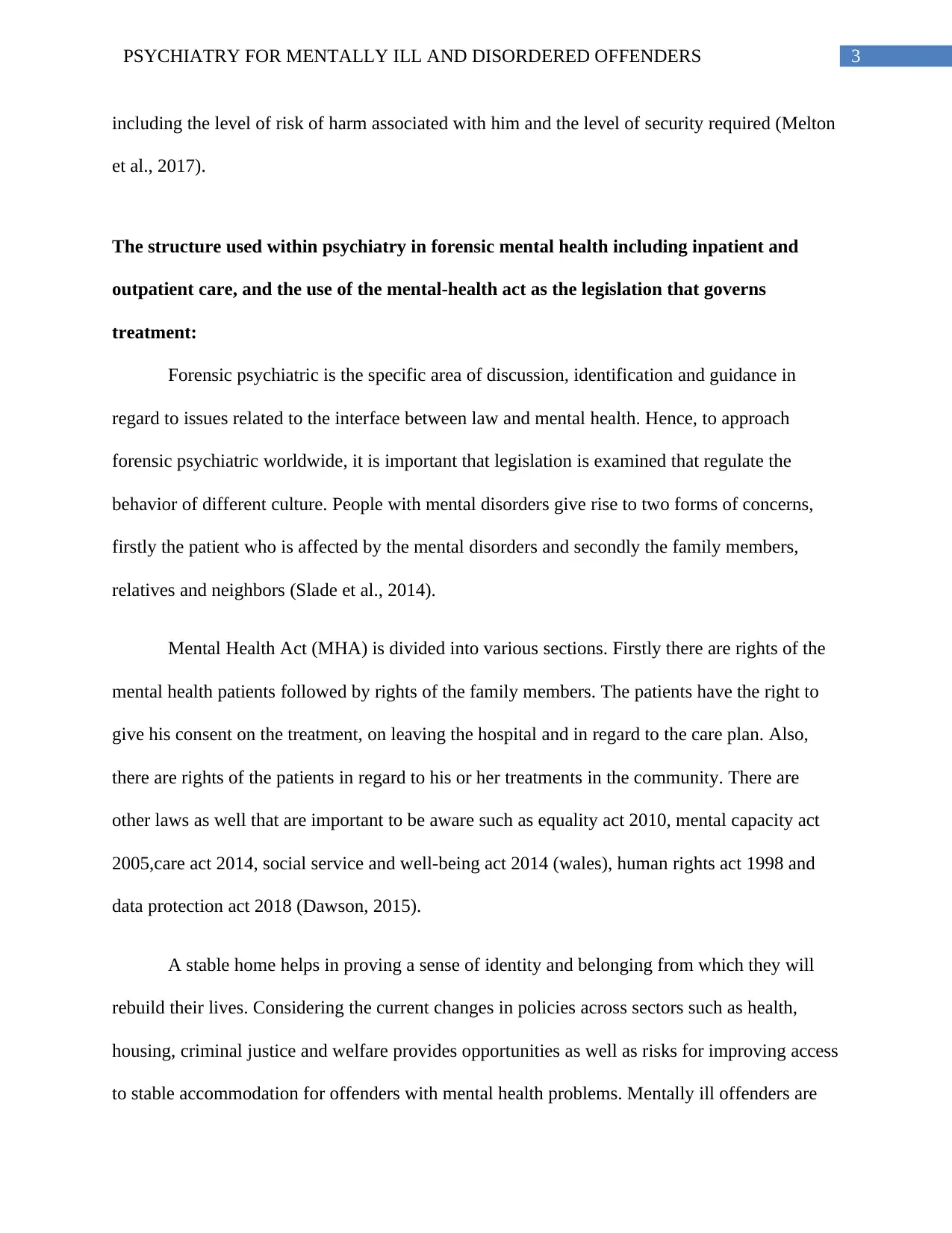
3PSYCHIATRY FOR MENTALLY ILL AND DISORDERED OFFENDERS
including the level of risk of harm associated with him and the level of security required (Melton
et al., 2017).
The structure used within psychiatry in forensic mental health including inpatient and
outpatient care, and the use of the mental-health act as the legislation that governs
treatment:
Forensic psychiatric is the specific area of discussion, identification and guidance in
regard to issues related to the interface between law and mental health. Hence, to approach
forensic psychiatric worldwide, it is important that legislation is examined that regulate the
behavior of different culture. People with mental disorders give rise to two forms of concerns,
firstly the patient who is affected by the mental disorders and secondly the family members,
relatives and neighbors (Slade et al., 2014).
Mental Health Act (MHA) is divided into various sections. Firstly there are rights of the
mental health patients followed by rights of the family members. The patients have the right to
give his consent on the treatment, on leaving the hospital and in regard to the care plan. Also,
there are rights of the patients in regard to his or her treatments in the community. There are
other laws as well that are important to be aware such as equality act 2010, mental capacity act
2005,care act 2014, social service and well-being act 2014 (wales), human rights act 1998 and
data protection act 2018 (Dawson, 2015).
A stable home helps in proving a sense of identity and belonging from which they will
rebuild their lives. Considering the current changes in policies across sectors such as health,
housing, criminal justice and welfare provides opportunities as well as risks for improving access
to stable accommodation for offenders with mental health problems. Mentally ill offenders are
including the level of risk of harm associated with him and the level of security required (Melton
et al., 2017).
The structure used within psychiatry in forensic mental health including inpatient and
outpatient care, and the use of the mental-health act as the legislation that governs
treatment:
Forensic psychiatric is the specific area of discussion, identification and guidance in
regard to issues related to the interface between law and mental health. Hence, to approach
forensic psychiatric worldwide, it is important that legislation is examined that regulate the
behavior of different culture. People with mental disorders give rise to two forms of concerns,
firstly the patient who is affected by the mental disorders and secondly the family members,
relatives and neighbors (Slade et al., 2014).
Mental Health Act (MHA) is divided into various sections. Firstly there are rights of the
mental health patients followed by rights of the family members. The patients have the right to
give his consent on the treatment, on leaving the hospital and in regard to the care plan. Also,
there are rights of the patients in regard to his or her treatments in the community. There are
other laws as well that are important to be aware such as equality act 2010, mental capacity act
2005,care act 2014, social service and well-being act 2014 (wales), human rights act 1998 and
data protection act 2018 (Dawson, 2015).
A stable home helps in proving a sense of identity and belonging from which they will
rebuild their lives. Considering the current changes in policies across sectors such as health,
housing, criminal justice and welfare provides opportunities as well as risks for improving access
to stable accommodation for offenders with mental health problems. Mentally ill offenders are
Paraphrase This Document
Need a fresh take? Get an instant paraphrase of this document with our AI Paraphraser
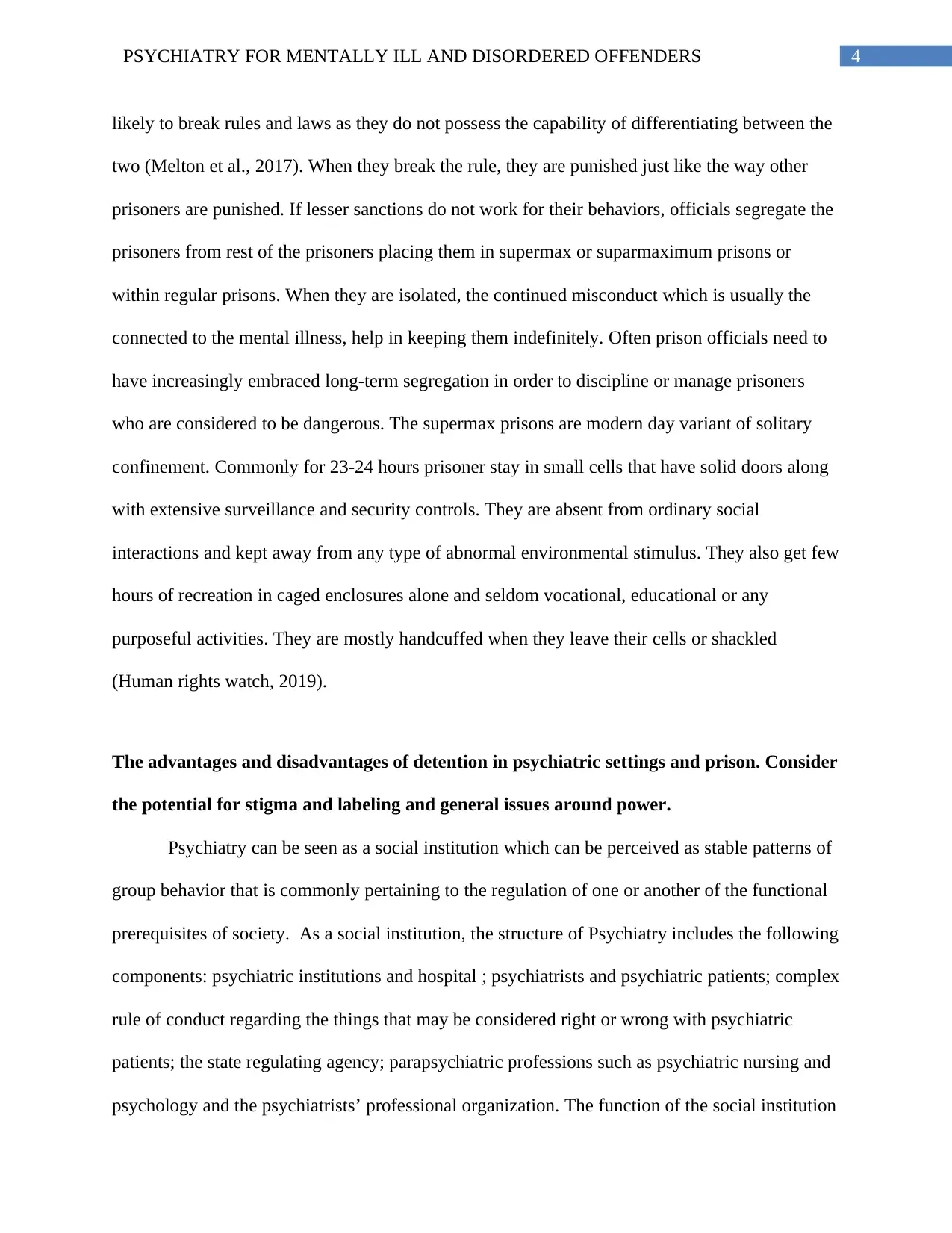
4PSYCHIATRY FOR MENTALLY ILL AND DISORDERED OFFENDERS
likely to break rules and laws as they do not possess the capability of differentiating between the
two (Melton et al., 2017). When they break the rule, they are punished just like the way other
prisoners are punished. If lesser sanctions do not work for their behaviors, officials segregate the
prisoners from rest of the prisoners placing them in supermax or suparmaximum prisons or
within regular prisons. When they are isolated, the continued misconduct which is usually the
connected to the mental illness, help in keeping them indefinitely. Often prison officials need to
have increasingly embraced long-term segregation in order to discipline or manage prisoners
who are considered to be dangerous. The supermax prisons are modern day variant of solitary
confinement. Commonly for 23-24 hours prisoner stay in small cells that have solid doors along
with extensive surveillance and security controls. They are absent from ordinary social
interactions and kept away from any type of abnormal environmental stimulus. They also get few
hours of recreation in caged enclosures alone and seldom vocational, educational or any
purposeful activities. They are mostly handcuffed when they leave their cells or shackled
(Human rights watch, 2019).
The advantages and disadvantages of detention in psychiatric settings and prison. Consider
the potential for stigma and labeling and general issues around power.
Psychiatry can be seen as a social institution which can be perceived as stable patterns of
group behavior that is commonly pertaining to the regulation of one or another of the functional
prerequisites of society. As a social institution, the structure of Psychiatry includes the following
components: psychiatric institutions and hospital ; psychiatrists and psychiatric patients; complex
rule of conduct regarding the things that may be considered right or wrong with psychiatric
patients; the state regulating agency; parapsychiatric professions such as psychiatric nursing and
psychology and the psychiatrists’ professional organization. The function of the social institution
likely to break rules and laws as they do not possess the capability of differentiating between the
two (Melton et al., 2017). When they break the rule, they are punished just like the way other
prisoners are punished. If lesser sanctions do not work for their behaviors, officials segregate the
prisoners from rest of the prisoners placing them in supermax or suparmaximum prisons or
within regular prisons. When they are isolated, the continued misconduct which is usually the
connected to the mental illness, help in keeping them indefinitely. Often prison officials need to
have increasingly embraced long-term segregation in order to discipline or manage prisoners
who are considered to be dangerous. The supermax prisons are modern day variant of solitary
confinement. Commonly for 23-24 hours prisoner stay in small cells that have solid doors along
with extensive surveillance and security controls. They are absent from ordinary social
interactions and kept away from any type of abnormal environmental stimulus. They also get few
hours of recreation in caged enclosures alone and seldom vocational, educational or any
purposeful activities. They are mostly handcuffed when they leave their cells or shackled
(Human rights watch, 2019).
The advantages and disadvantages of detention in psychiatric settings and prison. Consider
the potential for stigma and labeling and general issues around power.
Psychiatry can be seen as a social institution which can be perceived as stable patterns of
group behavior that is commonly pertaining to the regulation of one or another of the functional
prerequisites of society. As a social institution, the structure of Psychiatry includes the following
components: psychiatric institutions and hospital ; psychiatrists and psychiatric patients; complex
rule of conduct regarding the things that may be considered right or wrong with psychiatric
patients; the state regulating agency; parapsychiatric professions such as psychiatric nursing and
psychology and the psychiatrists’ professional organization. The function of the social institution
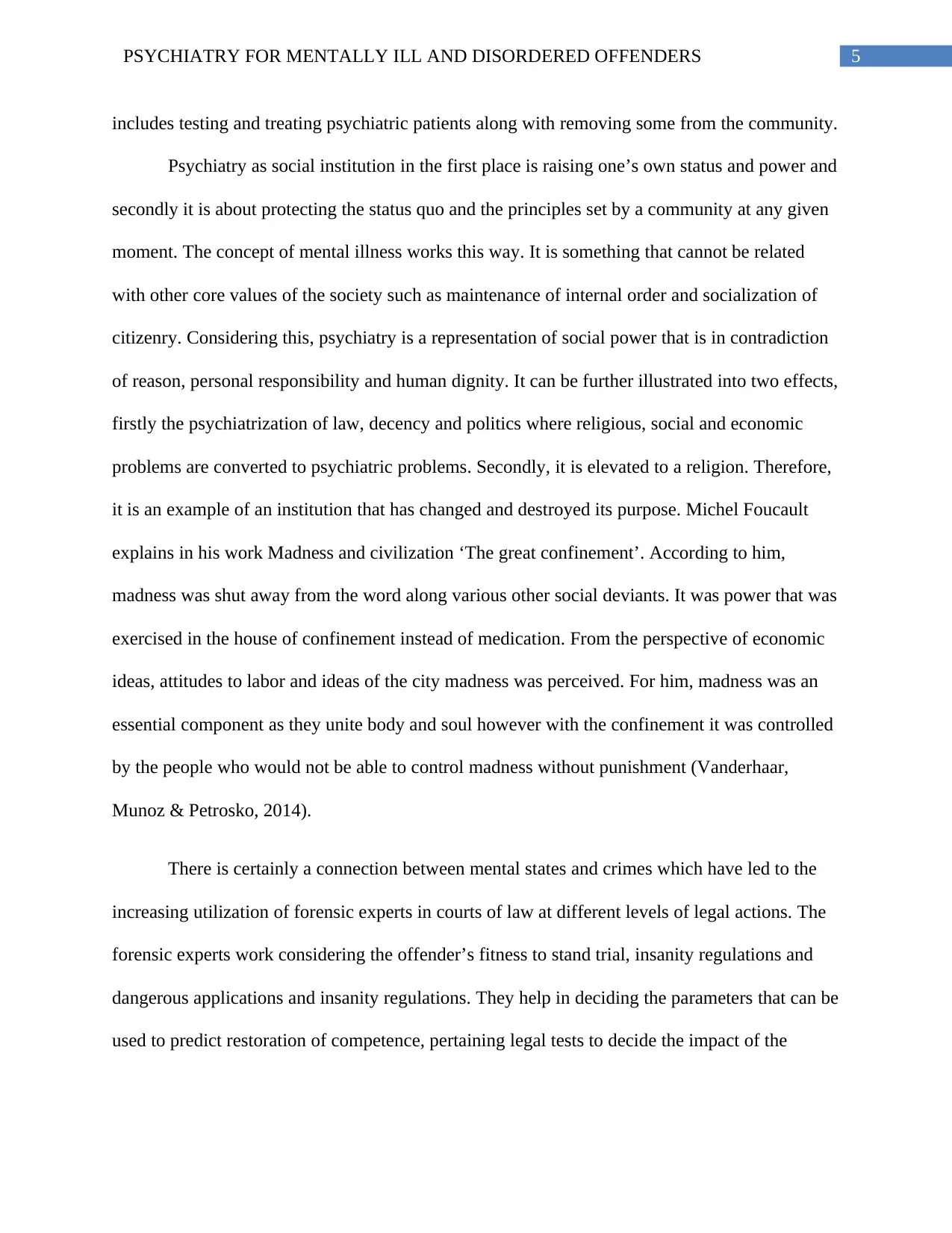
5PSYCHIATRY FOR MENTALLY ILL AND DISORDERED OFFENDERS
includes testing and treating psychiatric patients along with removing some from the community.
Psychiatry as social institution in the first place is raising one’s own status and power and
secondly it is about protecting the status quo and the principles set by a community at any given
moment. The concept of mental illness works this way. It is something that cannot be related
with other core values of the society such as maintenance of internal order and socialization of
citizenry. Considering this, psychiatry is a representation of social power that is in contradiction
of reason, personal responsibility and human dignity. It can be further illustrated into two effects,
firstly the psychiatrization of law, decency and politics where religious, social and economic
problems are converted to psychiatric problems. Secondly, it is elevated to a religion. Therefore,
it is an example of an institution that has changed and destroyed its purpose. Michel Foucault
explains in his work Madness and civilization ‘The great confinement’. According to him,
madness was shut away from the word along various other social deviants. It was power that was
exercised in the house of confinement instead of medication. From the perspective of economic
ideas, attitudes to labor and ideas of the city madness was perceived. For him, madness was an
essential component as they unite body and soul however with the confinement it was controlled
by the people who would not be able to control madness without punishment (Vanderhaar,
Munoz & Petrosko, 2014).
There is certainly a connection between mental states and crimes which have led to the
increasing utilization of forensic experts in courts of law at different levels of legal actions. The
forensic experts work considering the offender’s fitness to stand trial, insanity regulations and
dangerous applications and insanity regulations. They help in deciding the parameters that can be
used to predict restoration of competence, pertaining legal tests to decide the impact of the
includes testing and treating psychiatric patients along with removing some from the community.
Psychiatry as social institution in the first place is raising one’s own status and power and
secondly it is about protecting the status quo and the principles set by a community at any given
moment. The concept of mental illness works this way. It is something that cannot be related
with other core values of the society such as maintenance of internal order and socialization of
citizenry. Considering this, psychiatry is a representation of social power that is in contradiction
of reason, personal responsibility and human dignity. It can be further illustrated into two effects,
firstly the psychiatrization of law, decency and politics where religious, social and economic
problems are converted to psychiatric problems. Secondly, it is elevated to a religion. Therefore,
it is an example of an institution that has changed and destroyed its purpose. Michel Foucault
explains in his work Madness and civilization ‘The great confinement’. According to him,
madness was shut away from the word along various other social deviants. It was power that was
exercised in the house of confinement instead of medication. From the perspective of economic
ideas, attitudes to labor and ideas of the city madness was perceived. For him, madness was an
essential component as they unite body and soul however with the confinement it was controlled
by the people who would not be able to control madness without punishment (Vanderhaar,
Munoz & Petrosko, 2014).
There is certainly a connection between mental states and crimes which have led to the
increasing utilization of forensic experts in courts of law at different levels of legal actions. The
forensic experts work considering the offender’s fitness to stand trial, insanity regulations and
dangerous applications and insanity regulations. They help in deciding the parameters that can be
used to predict restoration of competence, pertaining legal tests to decide the impact of the
⊘ This is a preview!⊘
Do you want full access?
Subscribe today to unlock all pages.

Trusted by 1+ million students worldwide
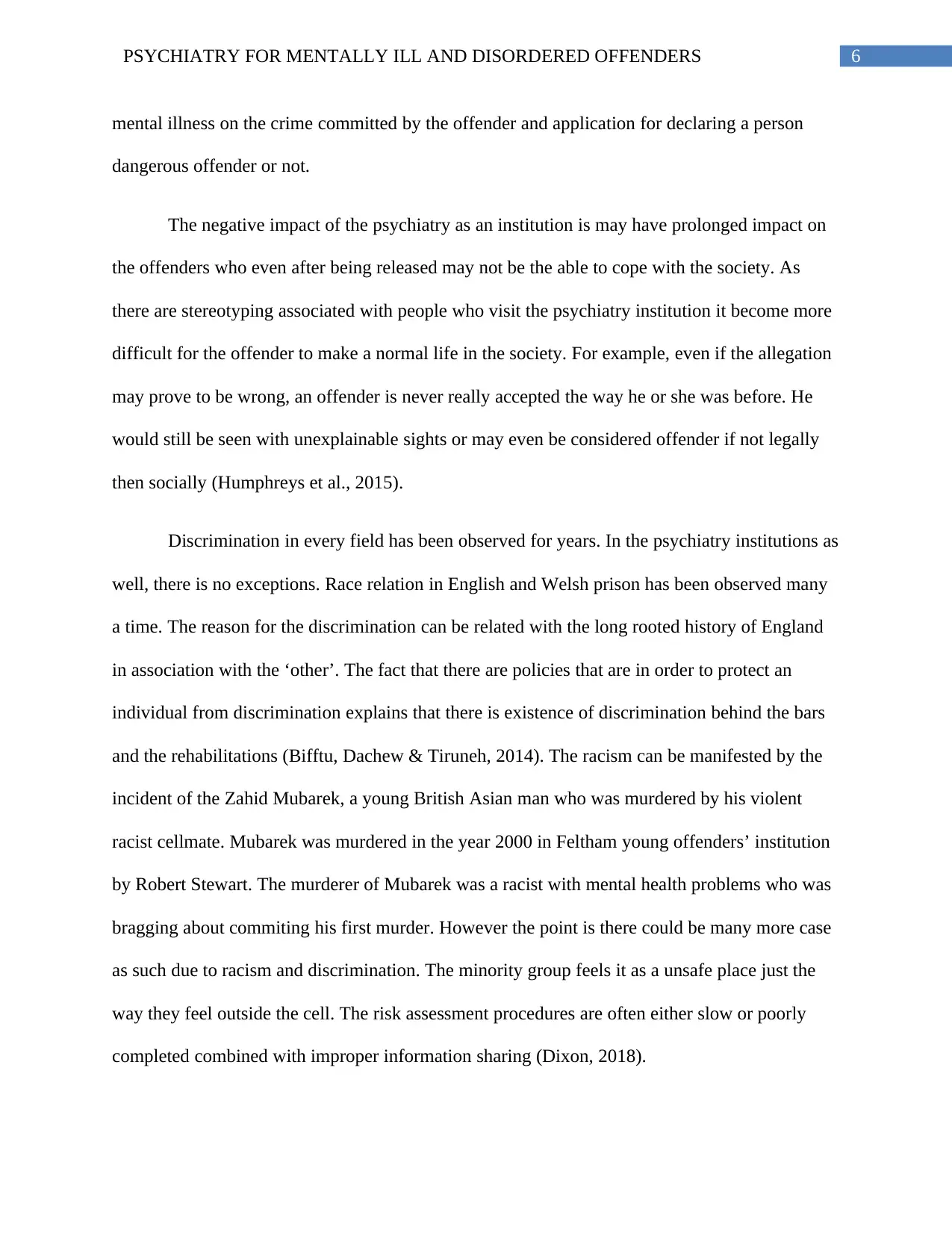
6PSYCHIATRY FOR MENTALLY ILL AND DISORDERED OFFENDERS
mental illness on the crime committed by the offender and application for declaring a person
dangerous offender or not.
The negative impact of the psychiatry as an institution is may have prolonged impact on
the offenders who even after being released may not be the able to cope with the society. As
there are stereotyping associated with people who visit the psychiatry institution it become more
difficult for the offender to make a normal life in the society. For example, even if the allegation
may prove to be wrong, an offender is never really accepted the way he or she was before. He
would still be seen with unexplainable sights or may even be considered offender if not legally
then socially (Humphreys et al., 2015).
Discrimination in every field has been observed for years. In the psychiatry institutions as
well, there is no exceptions. Race relation in English and Welsh prison has been observed many
a time. The reason for the discrimination can be related with the long rooted history of England
in association with the ‘other’. The fact that there are policies that are in order to protect an
individual from discrimination explains that there is existence of discrimination behind the bars
and the rehabilitations (Bifftu, Dachew & Tiruneh, 2014). The racism can be manifested by the
incident of the Zahid Mubarek, a young British Asian man who was murdered by his violent
racist cellmate. Mubarek was murdered in the year 2000 in Feltham young offenders’ institution
by Robert Stewart. The murderer of Mubarek was a racist with mental health problems who was
bragging about commiting his first murder. However the point is there could be many more case
as such due to racism and discrimination. The minority group feels it as a unsafe place just the
way they feel outside the cell. The risk assessment procedures are often either slow or poorly
completed combined with improper information sharing (Dixon, 2018).
mental illness on the crime committed by the offender and application for declaring a person
dangerous offender or not.
The negative impact of the psychiatry as an institution is may have prolonged impact on
the offenders who even after being released may not be the able to cope with the society. As
there are stereotyping associated with people who visit the psychiatry institution it become more
difficult for the offender to make a normal life in the society. For example, even if the allegation
may prove to be wrong, an offender is never really accepted the way he or she was before. He
would still be seen with unexplainable sights or may even be considered offender if not legally
then socially (Humphreys et al., 2015).
Discrimination in every field has been observed for years. In the psychiatry institutions as
well, there is no exceptions. Race relation in English and Welsh prison has been observed many
a time. The reason for the discrimination can be related with the long rooted history of England
in association with the ‘other’. The fact that there are policies that are in order to protect an
individual from discrimination explains that there is existence of discrimination behind the bars
and the rehabilitations (Bifftu, Dachew & Tiruneh, 2014). The racism can be manifested by the
incident of the Zahid Mubarek, a young British Asian man who was murdered by his violent
racist cellmate. Mubarek was murdered in the year 2000 in Feltham young offenders’ institution
by Robert Stewart. The murderer of Mubarek was a racist with mental health problems who was
bragging about commiting his first murder. However the point is there could be many more case
as such due to racism and discrimination. The minority group feels it as a unsafe place just the
way they feel outside the cell. The risk assessment procedures are often either slow or poorly
completed combined with improper information sharing (Dixon, 2018).
Paraphrase This Document
Need a fresh take? Get an instant paraphrase of this document with our AI Paraphraser
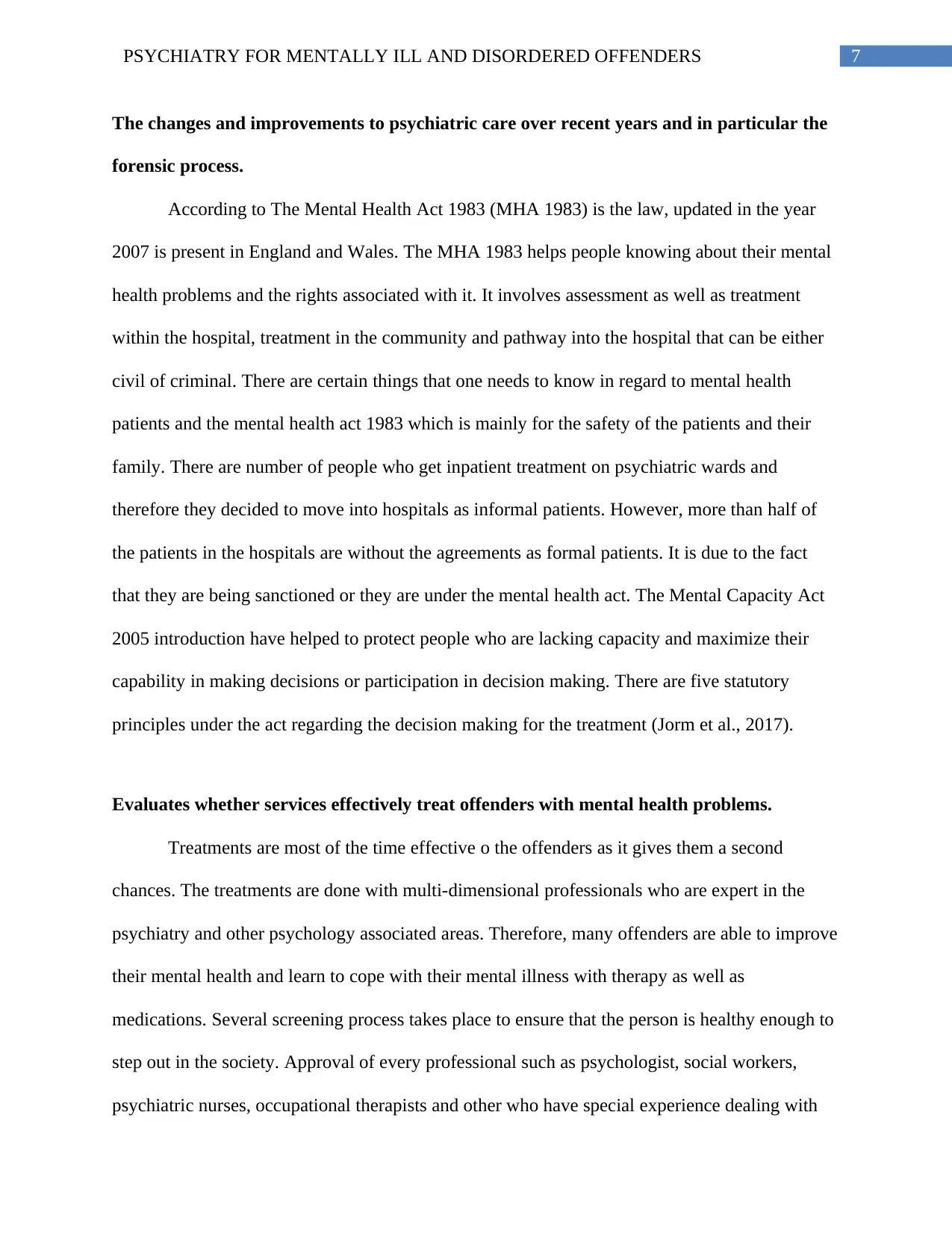
7PSYCHIATRY FOR MENTALLY ILL AND DISORDERED OFFENDERS
The changes and improvements to psychiatric care over recent years and in particular the
forensic process.
According to The Mental Health Act 1983 (MHA 1983) is the law, updated in the year
2007 is present in England and Wales. The MHA 1983 helps people knowing about their mental
health problems and the rights associated with it. It involves assessment as well as treatment
within the hospital, treatment in the community and pathway into the hospital that can be either
civil of criminal. There are certain things that one needs to know in regard to mental health
patients and the mental health act 1983 which is mainly for the safety of the patients and their
family. There are number of people who get inpatient treatment on psychiatric wards and
therefore they decided to move into hospitals as informal patients. However, more than half of
the patients in the hospitals are without the agreements as formal patients. It is due to the fact
that they are being sanctioned or they are under the mental health act. The Mental Capacity Act
2005 introduction have helped to protect people who are lacking capacity and maximize their
capability in making decisions or participation in decision making. There are five statutory
principles under the act regarding the decision making for the treatment (Jorm et al., 2017).
Evaluates whether services effectively treat offenders with mental health problems.
Treatments are most of the time effective o the offenders as it gives them a second
chances. The treatments are done with multi-dimensional professionals who are expert in the
psychiatry and other psychology associated areas. Therefore, many offenders are able to improve
their mental health and learn to cope with their mental illness with therapy as well as
medications. Several screening process takes place to ensure that the person is healthy enough to
step out in the society. Approval of every professional such as psychologist, social workers,
psychiatric nurses, occupational therapists and other who have special experience dealing with
The changes and improvements to psychiatric care over recent years and in particular the
forensic process.
According to The Mental Health Act 1983 (MHA 1983) is the law, updated in the year
2007 is present in England and Wales. The MHA 1983 helps people knowing about their mental
health problems and the rights associated with it. It involves assessment as well as treatment
within the hospital, treatment in the community and pathway into the hospital that can be either
civil of criminal. There are certain things that one needs to know in regard to mental health
patients and the mental health act 1983 which is mainly for the safety of the patients and their
family. There are number of people who get inpatient treatment on psychiatric wards and
therefore they decided to move into hospitals as informal patients. However, more than half of
the patients in the hospitals are without the agreements as formal patients. It is due to the fact
that they are being sanctioned or they are under the mental health act. The Mental Capacity Act
2005 introduction have helped to protect people who are lacking capacity and maximize their
capability in making decisions or participation in decision making. There are five statutory
principles under the act regarding the decision making for the treatment (Jorm et al., 2017).
Evaluates whether services effectively treat offenders with mental health problems.
Treatments are most of the time effective o the offenders as it gives them a second
chances. The treatments are done with multi-dimensional professionals who are expert in the
psychiatry and other psychology associated areas. Therefore, many offenders are able to improve
their mental health and learn to cope with their mental illness with therapy as well as
medications. Several screening process takes place to ensure that the person is healthy enough to
step out in the society. Approval of every professional such as psychologist, social workers,
psychiatric nurses, occupational therapists and other who have special experience dealing with
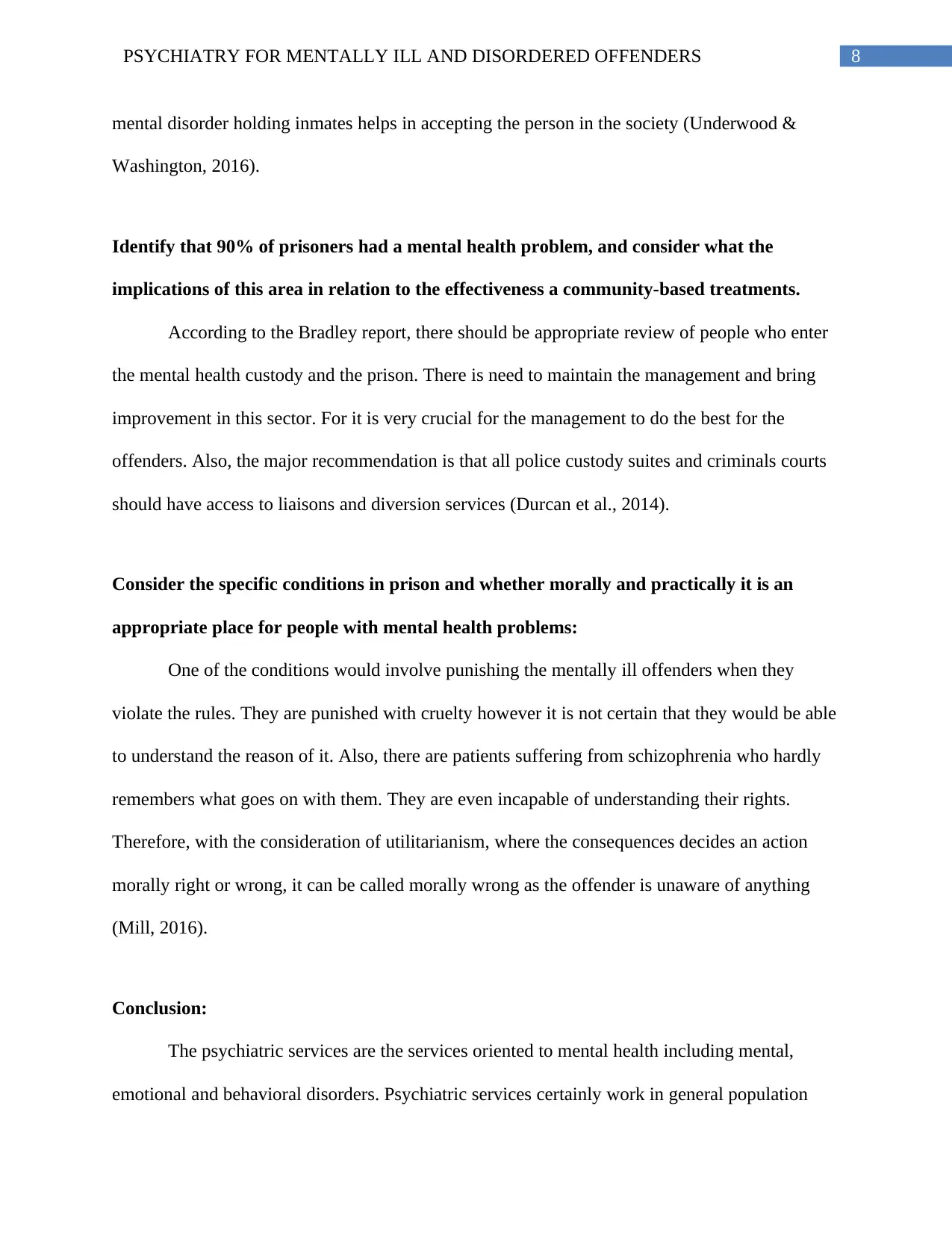
8PSYCHIATRY FOR MENTALLY ILL AND DISORDERED OFFENDERS
mental disorder holding inmates helps in accepting the person in the society (Underwood &
Washington, 2016).
Identify that 90% of prisoners had a mental health problem, and consider what the
implications of this area in relation to the effectiveness a community-based treatments.
According to the Bradley report, there should be appropriate review of people who enter
the mental health custody and the prison. There is need to maintain the management and bring
improvement in this sector. For it is very crucial for the management to do the best for the
offenders. Also, the major recommendation is that all police custody suites and criminals courts
should have access to liaisons and diversion services (Durcan et al., 2014).
Consider the specific conditions in prison and whether morally and practically it is an
appropriate place for people with mental health problems:
One of the conditions would involve punishing the mentally ill offenders when they
violate the rules. They are punished with cruelty however it is not certain that they would be able
to understand the reason of it. Also, there are patients suffering from schizophrenia who hardly
remembers what goes on with them. They are even incapable of understanding their rights.
Therefore, with the consideration of utilitarianism, where the consequences decides an action
morally right or wrong, it can be called morally wrong as the offender is unaware of anything
(Mill, 2016).
Conclusion:
The psychiatric services are the services oriented to mental health including mental,
emotional and behavioral disorders. Psychiatric services certainly work in general population
mental disorder holding inmates helps in accepting the person in the society (Underwood &
Washington, 2016).
Identify that 90% of prisoners had a mental health problem, and consider what the
implications of this area in relation to the effectiveness a community-based treatments.
According to the Bradley report, there should be appropriate review of people who enter
the mental health custody and the prison. There is need to maintain the management and bring
improvement in this sector. For it is very crucial for the management to do the best for the
offenders. Also, the major recommendation is that all police custody suites and criminals courts
should have access to liaisons and diversion services (Durcan et al., 2014).
Consider the specific conditions in prison and whether morally and practically it is an
appropriate place for people with mental health problems:
One of the conditions would involve punishing the mentally ill offenders when they
violate the rules. They are punished with cruelty however it is not certain that they would be able
to understand the reason of it. Also, there are patients suffering from schizophrenia who hardly
remembers what goes on with them. They are even incapable of understanding their rights.
Therefore, with the consideration of utilitarianism, where the consequences decides an action
morally right or wrong, it can be called morally wrong as the offender is unaware of anything
(Mill, 2016).
Conclusion:
The psychiatric services are the services oriented to mental health including mental,
emotional and behavioral disorders. Psychiatric services certainly work in general population
⊘ This is a preview!⊘
Do you want full access?
Subscribe today to unlock all pages.

Trusted by 1+ million students worldwide
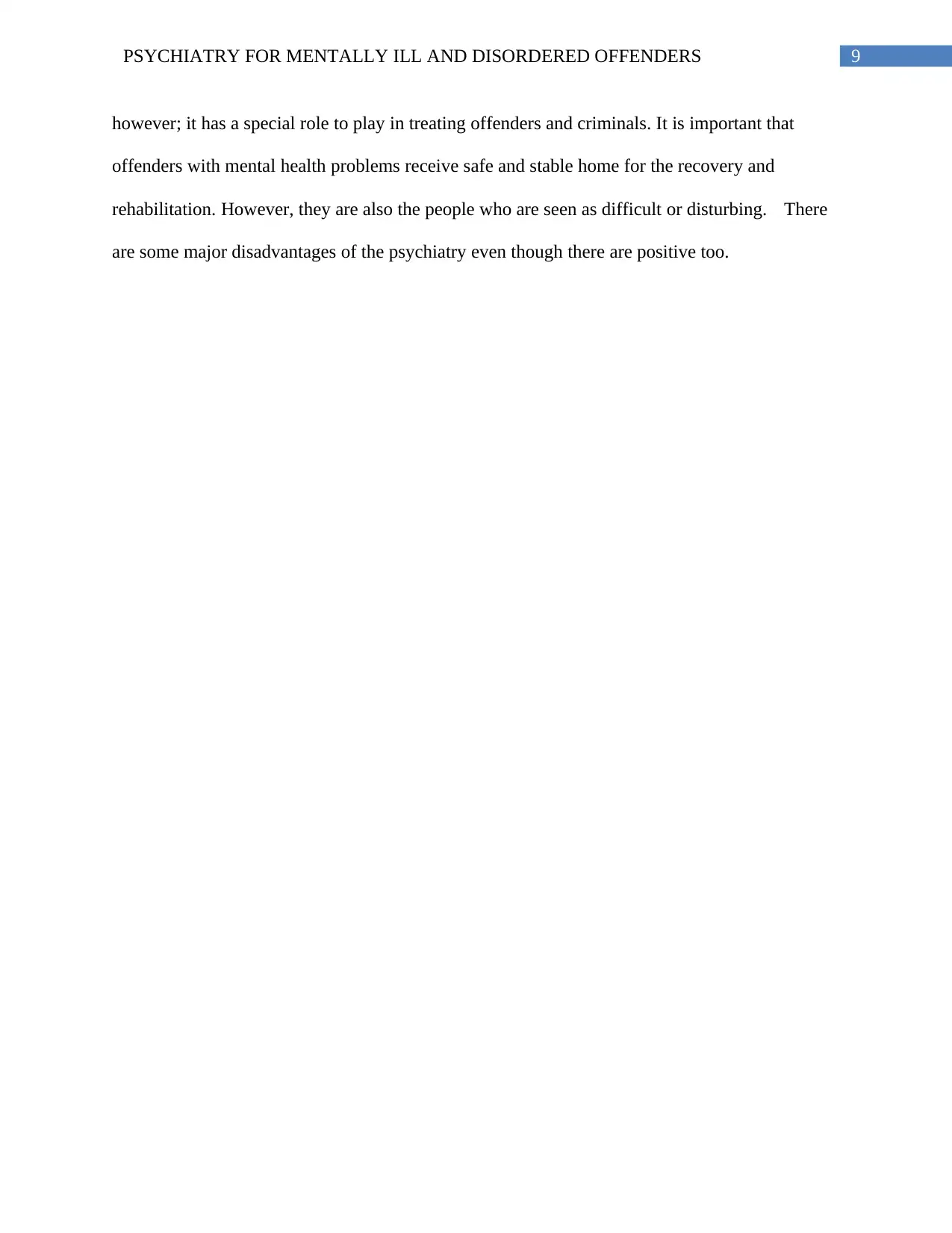
9PSYCHIATRY FOR MENTALLY ILL AND DISORDERED OFFENDERS
however; it has a special role to play in treating offenders and criminals. It is important that
offenders with mental health problems receive safe and stable home for the recovery and
rehabilitation. However, they are also the people who are seen as difficult or disturbing. There
are some major disadvantages of the psychiatry even though there are positive too.
however; it has a special role to play in treating offenders and criminals. It is important that
offenders with mental health problems receive safe and stable home for the recovery and
rehabilitation. However, they are also the people who are seen as difficult or disturbing. There
are some major disadvantages of the psychiatry even though there are positive too.
Paraphrase This Document
Need a fresh take? Get an instant paraphrase of this document with our AI Paraphraser
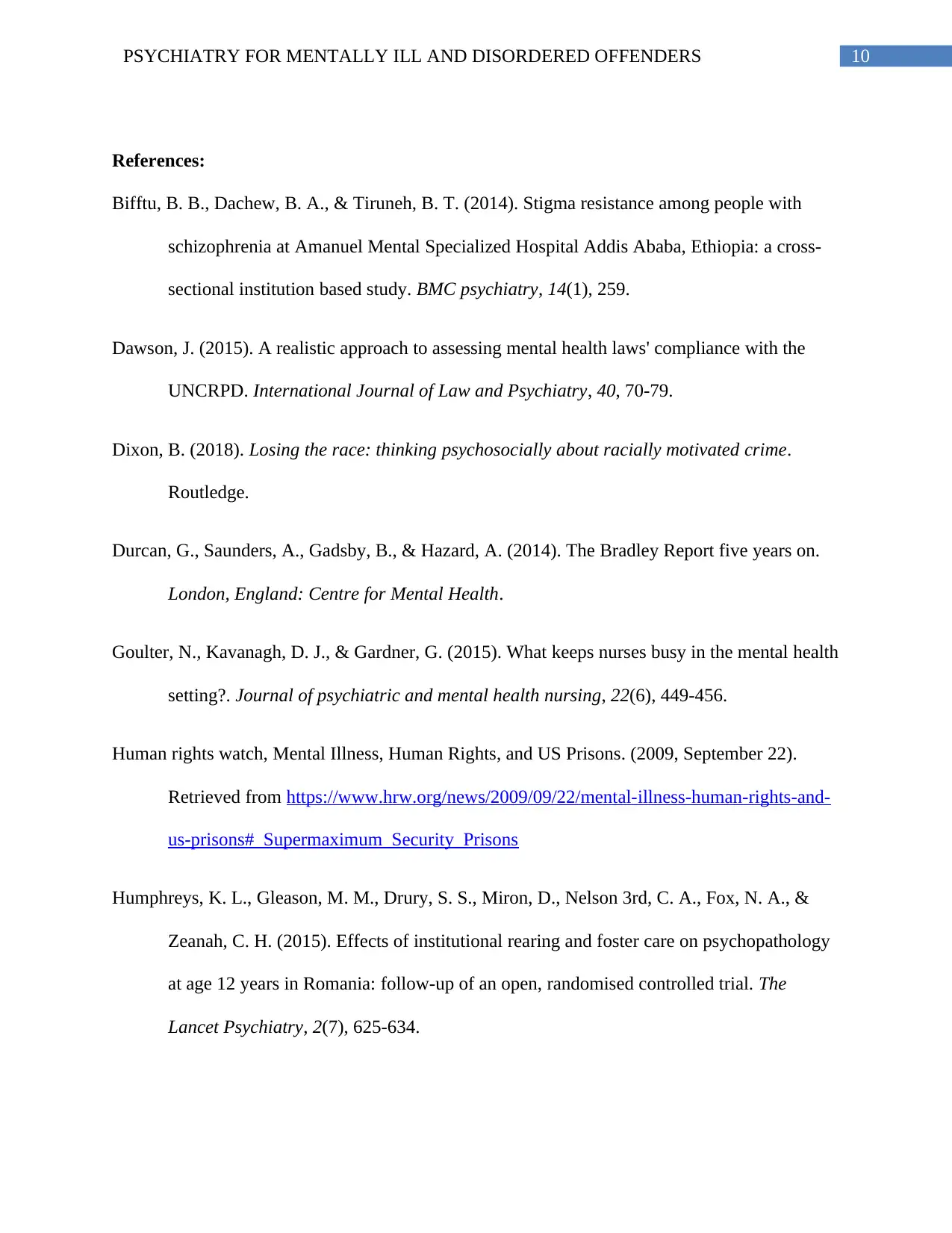
10PSYCHIATRY FOR MENTALLY ILL AND DISORDERED OFFENDERS
References:
Bifftu, B. B., Dachew, B. A., & Tiruneh, B. T. (2014). Stigma resistance among people with
schizophrenia at Amanuel Mental Specialized Hospital Addis Ababa, Ethiopia: a cross-
sectional institution based study. BMC psychiatry, 14(1), 259.
Dawson, J. (2015). A realistic approach to assessing mental health laws' compliance with the
UNCRPD. International Journal of Law and Psychiatry, 40, 70-79.
Dixon, B. (2018). Losing the race: thinking psychosocially about racially motivated crime.
Routledge.
Durcan, G., Saunders, A., Gadsby, B., & Hazard, A. (2014). The Bradley Report five years on.
London, England: Centre for Mental Health.
Goulter, N., Kavanagh, D. J., & Gardner, G. (2015). What keeps nurses busy in the mental health
setting?. Journal of psychiatric and mental health nursing, 22(6), 449-456.
Human rights watch, Mental Illness, Human Rights, and US Prisons. (2009, September 22).
Retrieved from https://www.hrw.org/news/2009/09/22/mental-illness-human-rights-and-
us-prisons#_Supermaximum_Security_Prisons
Humphreys, K. L., Gleason, M. M., Drury, S. S., Miron, D., Nelson 3rd, C. A., Fox, N. A., &
Zeanah, C. H. (2015). Effects of institutional rearing and foster care on psychopathology
at age 12 years in Romania: follow-up of an open, randomised controlled trial. The
Lancet Psychiatry, 2(7), 625-634.
References:
Bifftu, B. B., Dachew, B. A., & Tiruneh, B. T. (2014). Stigma resistance among people with
schizophrenia at Amanuel Mental Specialized Hospital Addis Ababa, Ethiopia: a cross-
sectional institution based study. BMC psychiatry, 14(1), 259.
Dawson, J. (2015). A realistic approach to assessing mental health laws' compliance with the
UNCRPD. International Journal of Law and Psychiatry, 40, 70-79.
Dixon, B. (2018). Losing the race: thinking psychosocially about racially motivated crime.
Routledge.
Durcan, G., Saunders, A., Gadsby, B., & Hazard, A. (2014). The Bradley Report five years on.
London, England: Centre for Mental Health.
Goulter, N., Kavanagh, D. J., & Gardner, G. (2015). What keeps nurses busy in the mental health
setting?. Journal of psychiatric and mental health nursing, 22(6), 449-456.
Human rights watch, Mental Illness, Human Rights, and US Prisons. (2009, September 22).
Retrieved from https://www.hrw.org/news/2009/09/22/mental-illness-human-rights-and-
us-prisons#_Supermaximum_Security_Prisons
Humphreys, K. L., Gleason, M. M., Drury, S. S., Miron, D., Nelson 3rd, C. A., Fox, N. A., &
Zeanah, C. H. (2015). Effects of institutional rearing and foster care on psychopathology
at age 12 years in Romania: follow-up of an open, randomised controlled trial. The
Lancet Psychiatry, 2(7), 625-634.
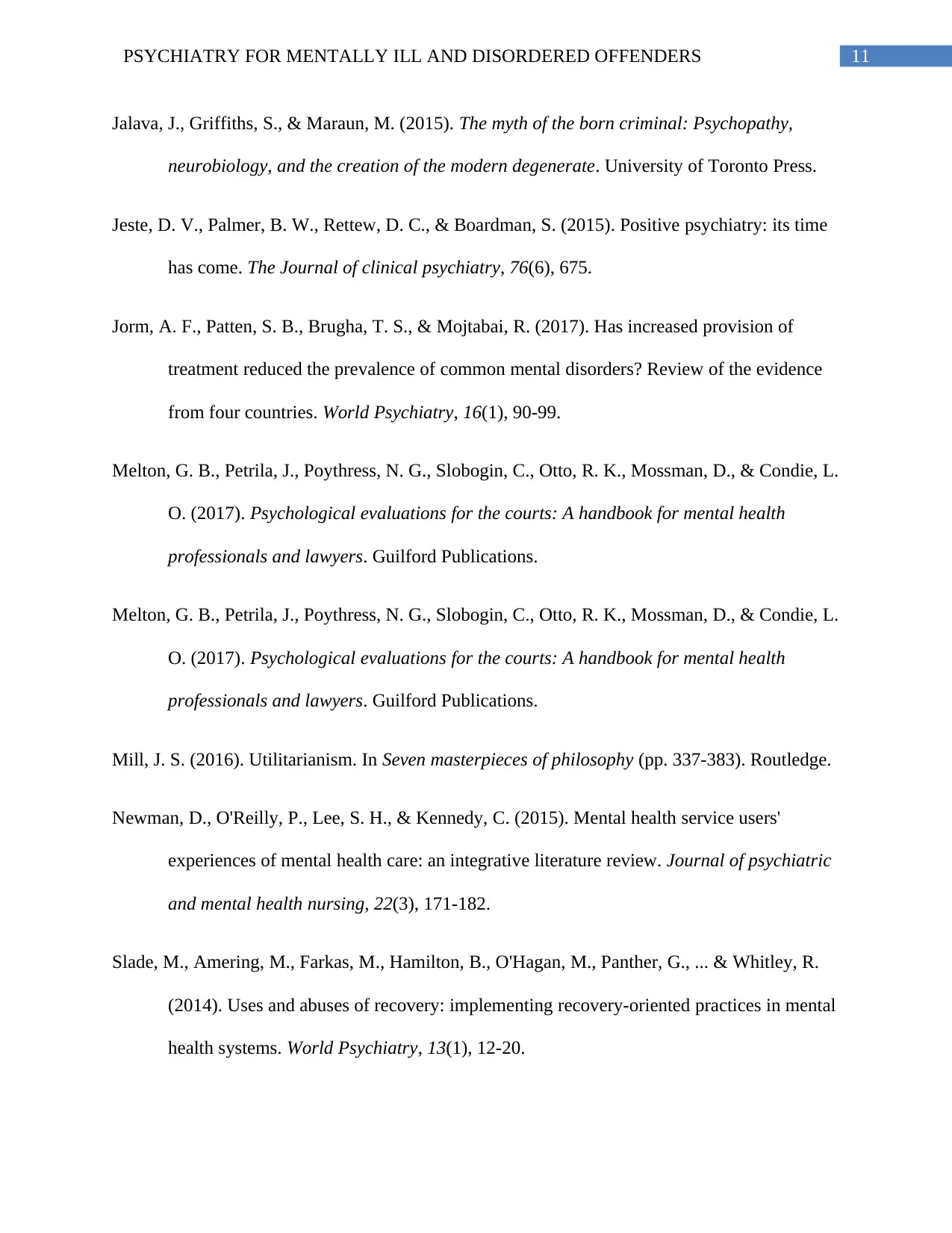
11PSYCHIATRY FOR MENTALLY ILL AND DISORDERED OFFENDERS
Jalava, J., Griffiths, S., & Maraun, M. (2015). The myth of the born criminal: Psychopathy,
neurobiology, and the creation of the modern degenerate. University of Toronto Press.
Jeste, D. V., Palmer, B. W., Rettew, D. C., & Boardman, S. (2015). Positive psychiatry: its time
has come. The Journal of clinical psychiatry, 76(6), 675.
Jorm, A. F., Patten, S. B., Brugha, T. S., & Mojtabai, R. (2017). Has increased provision of
treatment reduced the prevalence of common mental disorders? Review of the evidence
from four countries. World Psychiatry, 16(1), 90-99.
Melton, G. B., Petrila, J., Poythress, N. G., Slobogin, C., Otto, R. K., Mossman, D., & Condie, L.
O. (2017). Psychological evaluations for the courts: A handbook for mental health
professionals and lawyers. Guilford Publications.
Melton, G. B., Petrila, J., Poythress, N. G., Slobogin, C., Otto, R. K., Mossman, D., & Condie, L.
O. (2017). Psychological evaluations for the courts: A handbook for mental health
professionals and lawyers. Guilford Publications.
Mill, J. S. (2016). Utilitarianism. In Seven masterpieces of philosophy (pp. 337-383). Routledge.
Newman, D., O'Reilly, P., Lee, S. H., & Kennedy, C. (2015). Mental health service users'
experiences of mental health care: an integrative literature review. Journal of psychiatric
and mental health nursing, 22(3), 171-182.
Slade, M., Amering, M., Farkas, M., Hamilton, B., O'Hagan, M., Panther, G., ... & Whitley, R.
(2014). Uses and abuses of recovery: implementing recovery‐oriented practices in mental
health systems. World Psychiatry, 13(1), 12-20.
Jalava, J., Griffiths, S., & Maraun, M. (2015). The myth of the born criminal: Psychopathy,
neurobiology, and the creation of the modern degenerate. University of Toronto Press.
Jeste, D. V., Palmer, B. W., Rettew, D. C., & Boardman, S. (2015). Positive psychiatry: its time
has come. The Journal of clinical psychiatry, 76(6), 675.
Jorm, A. F., Patten, S. B., Brugha, T. S., & Mojtabai, R. (2017). Has increased provision of
treatment reduced the prevalence of common mental disorders? Review of the evidence
from four countries. World Psychiatry, 16(1), 90-99.
Melton, G. B., Petrila, J., Poythress, N. G., Slobogin, C., Otto, R. K., Mossman, D., & Condie, L.
O. (2017). Psychological evaluations for the courts: A handbook for mental health
professionals and lawyers. Guilford Publications.
Melton, G. B., Petrila, J., Poythress, N. G., Slobogin, C., Otto, R. K., Mossman, D., & Condie, L.
O. (2017). Psychological evaluations for the courts: A handbook for mental health
professionals and lawyers. Guilford Publications.
Mill, J. S. (2016). Utilitarianism. In Seven masterpieces of philosophy (pp. 337-383). Routledge.
Newman, D., O'Reilly, P., Lee, S. H., & Kennedy, C. (2015). Mental health service users'
experiences of mental health care: an integrative literature review. Journal of psychiatric
and mental health nursing, 22(3), 171-182.
Slade, M., Amering, M., Farkas, M., Hamilton, B., O'Hagan, M., Panther, G., ... & Whitley, R.
(2014). Uses and abuses of recovery: implementing recovery‐oriented practices in mental
health systems. World Psychiatry, 13(1), 12-20.
⊘ This is a preview!⊘
Do you want full access?
Subscribe today to unlock all pages.

Trusted by 1+ million students worldwide
1 out of 13
Related Documents
Your All-in-One AI-Powered Toolkit for Academic Success.
+13062052269
info@desklib.com
Available 24*7 on WhatsApp / Email
![[object Object]](/_next/static/media/star-bottom.7253800d.svg)
Unlock your academic potential
Copyright © 2020–2026 A2Z Services. All Rights Reserved. Developed and managed by ZUCOL.





